Suppose you have a family member, friend, or co-worker in a court of law facing criminal charges, a drunk driving offense, or child custody. In that case, you can help the judge make a ruling in the defendant’s favor by writing a character reference letter. In addition, it’s important to note that there is another type of letter for a court known as an immigration character reference letter. It’s for individuals who are entering the court to sort out their immigration issues.
Customizable Templates
Character reference letters for the court can play a crucial role in presenting a favorable impression of an individual’s character and integrity to the court. Whether you’re a friend, colleague, or employer, these free downloadable templates can assist you in crafting a compelling letter that highlights the positive qualities and experiences of the person involved. Offering support and insight into their moral character, work ethic, and overall reputation, these templates provide a helpful starting point to ensure your letter is well-structured, persuasive and meets the requirements of a court reference letter.
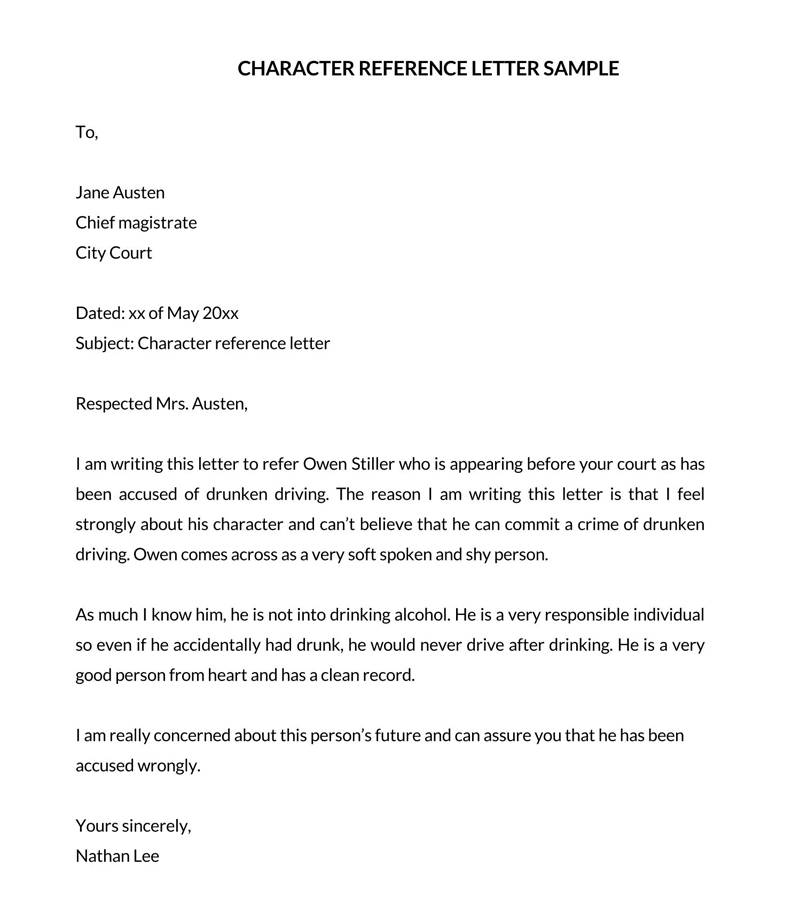
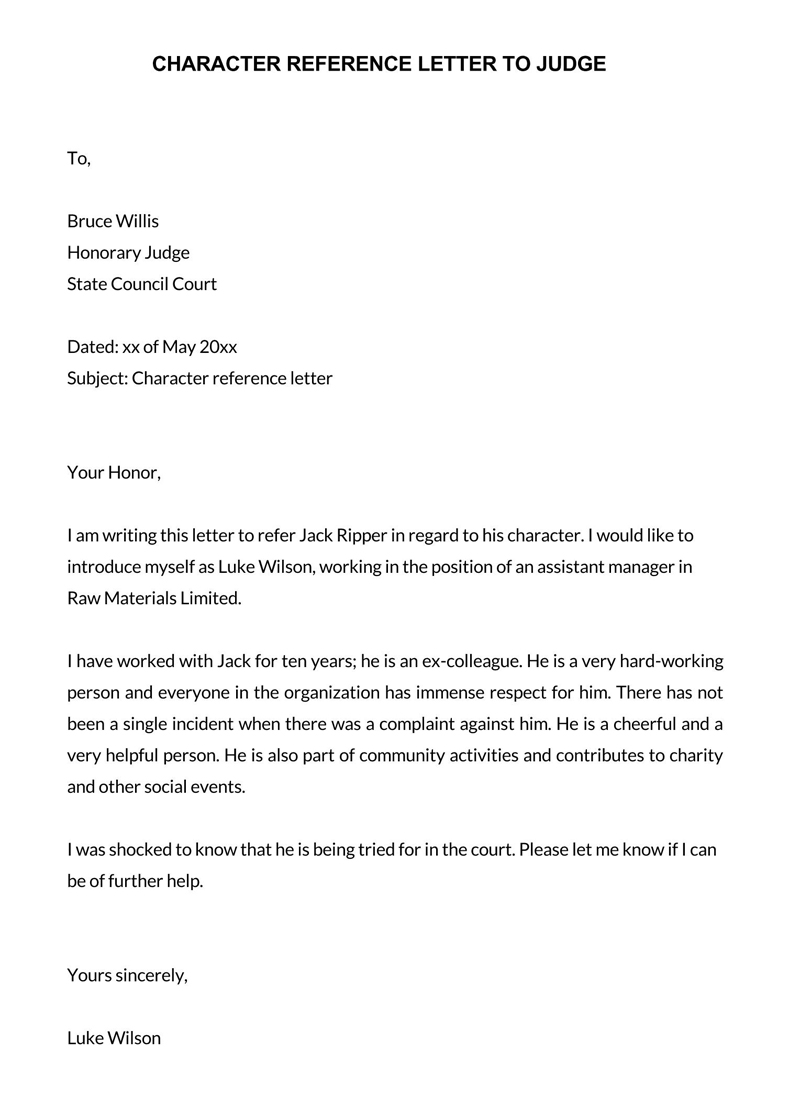
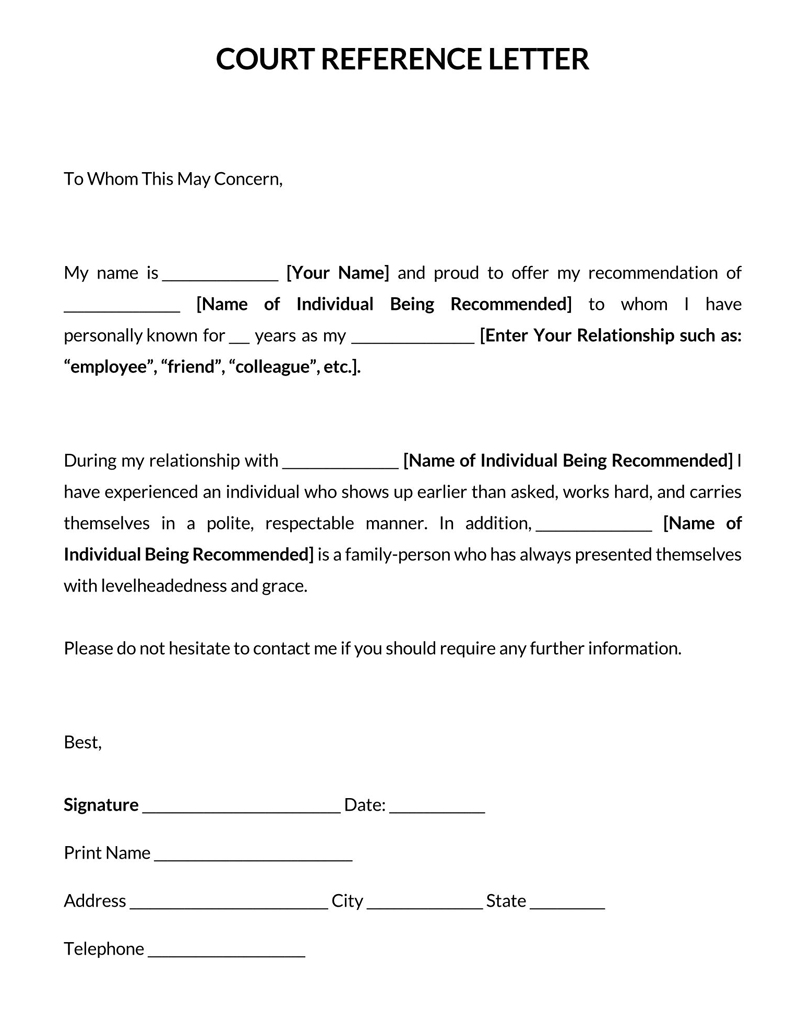
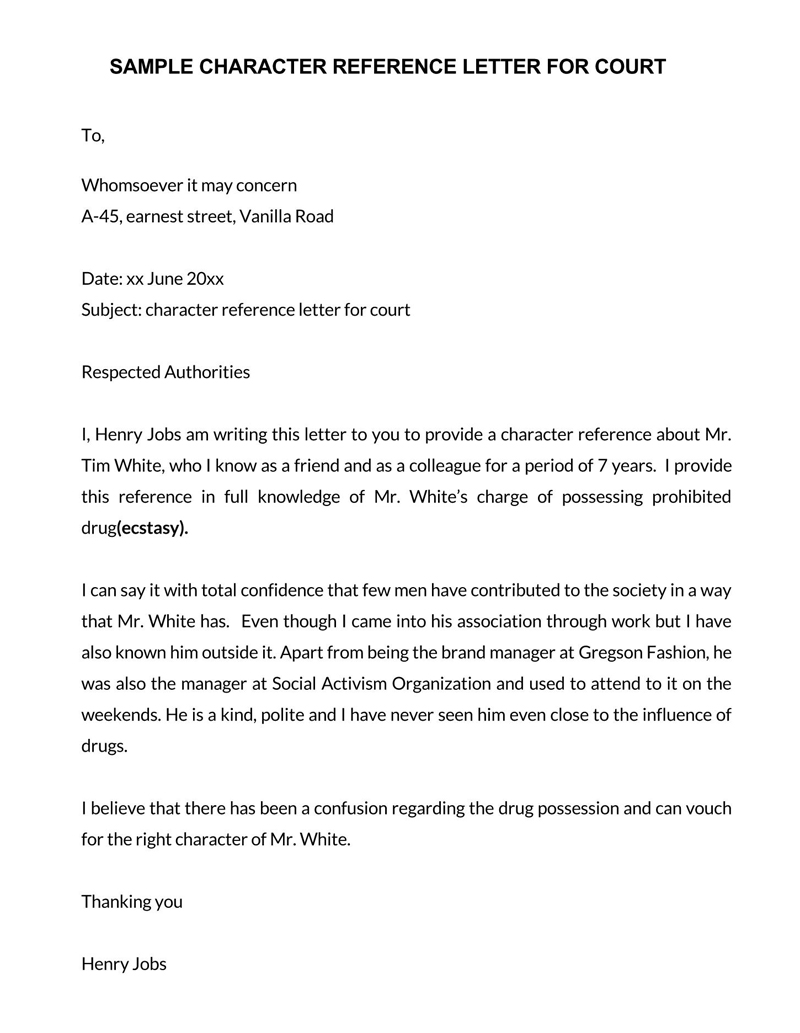
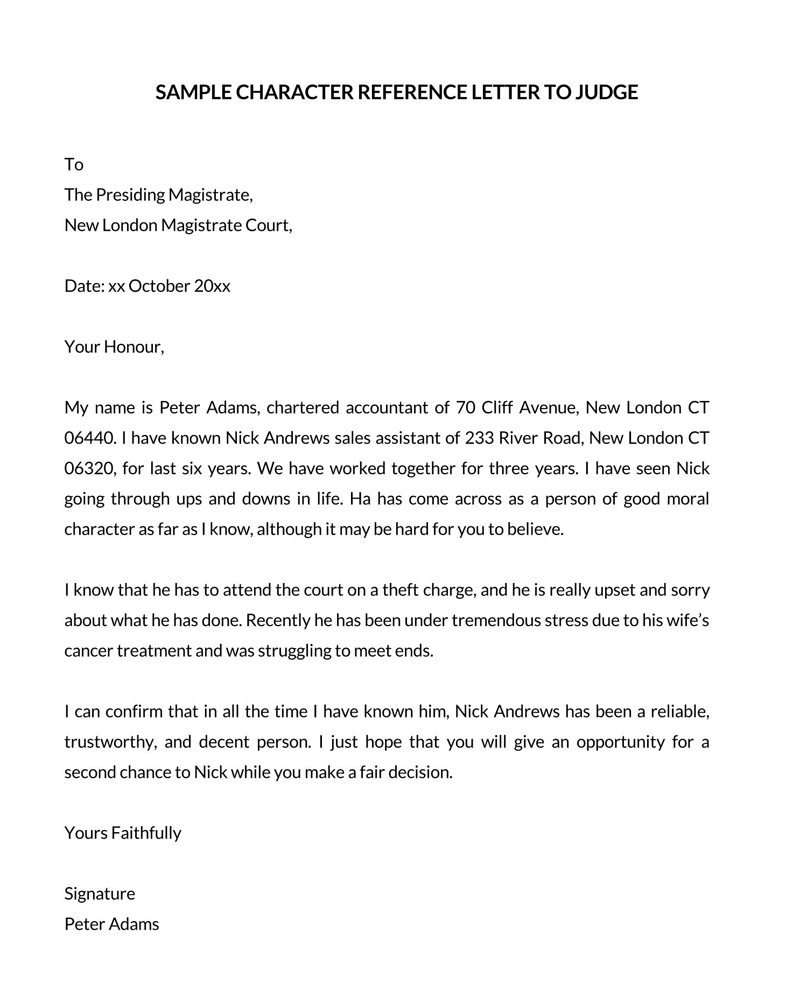
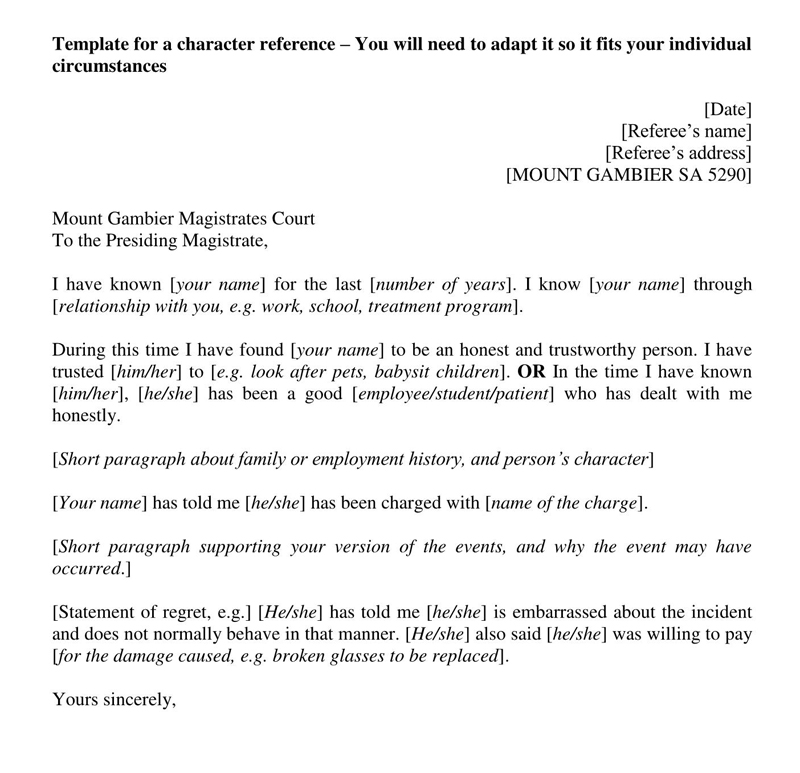
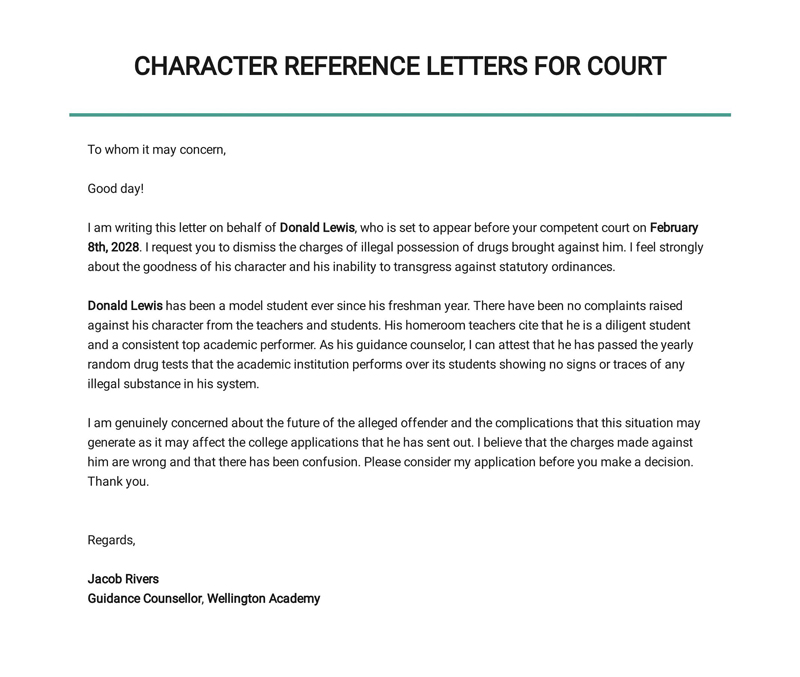
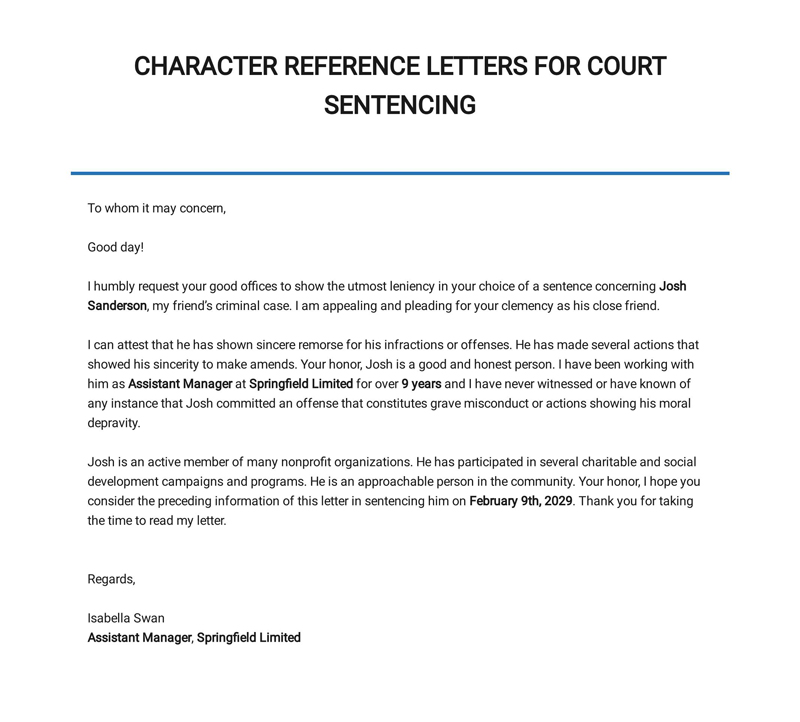
Why Use It?
A character reference letter for court is a formal document that provides a written statement about the personality and mental stability of the defendant to help the judge understand the defendant better when making a decision. It’s written to show support in favor of the defendant.
For it to be persuasive, the person writing must prove to the court that they know the defendant very well. It should bring out the positive side of the defendant and their contribution to society to help the judge see them from a different angle. The letter should also show maximum respect to the court and it should never be written in a way that undermines the defendant’s case.
Since it’s a very important legal document, the letter should be factual and professionally written for it to be effective.
Can Anyone Serve as a Referrer?
Although the court does not give a specific condition on who can write in support of the defendant, there is a group of people who are most recommended. It’s advisable to pick a person who has known you for a very long time and who is likely to draw respect and attention to the court.
The following cadre of people can act as good referrers:
A family member/relative
Your priority should go to members of your nuclear family. This is because they can testify better since they have a longer and deeper history with the defendant than any other person. If an immediate family member is not available, a closely related relative can write the letter in your support.
Co-worker
For defendants who are formally employed, getting a co-worker to write the letter is also a good choice. The best option is a person who is older than you in your workplace.
A friend
Your friend, who happens to be your closest associate, can also act as a referrer. They will need to prove to the court that they have known you for a longer period of time and that you are a person of good character.
Who, Why, and When?
The primary objective of the letter for the court is to support the defendant by helping the judge clearly understand the defendant’s personality type and historical morals. Referrers (mostly family members, friends, medical professionals, or co-workers) testify in a written statement about the defendant’s traits.
This letter is primarily used in a court of law for three major cases that include:
Criminal charges
Suppose you have a loved one who has been convicted and faces criminal charges like murder. In that case, you can provide the court with the letter to show the judge that the defendant’s offense was very unusual and unexpected, going by his known personality.
The letter tries to prove to the court that the defendant is a person of good character and that his recent ill behaviors were uncommon. When the court is well persuaded beyond reasonable doubt by the contents of the letter, it proceeds to give the defendant a fair punishment.
Drunk driving incident (DUI)
If a person has been convicted of a drunk driving incident (DUI), you can write a letter to the court to convince them that the defendant rarely drinks and drives. The letter will be more convincing if you happen to have known the defendant for an extended period and witnessed him driving.
Child custody
If the defendant is dealing with custody of children after separation or divorce, you will write a letter to the court describing them as a caring person. It’s highly advisable that the person writing the letter for the child custody case be someone who is very close to the defendant. The court will be more convinced if it’s a person who knows all aspects of the defendant’s lifestyle, like a family member or very close friend.
To increase the chances of the court making a fair ruling, the person drafting the letter is highly encouraged to engage an experienced lawyer to review the document first before submitting it to the court.
It’s essential for the person writing the letter for the court to understand that this is an official document, and any false statement or forgery can lead to prosecution.
How to Write a Character Reference Letter for Court
Since this is an official document that will be used in a court of law, the author must submit a well-written document to persuade the judge to make a fair ruling. Although there is no standard format that must be followed when writing the letter, there are specific sections that every author must include when drafting the letter:
Section 1: Header
As an official document, the header section of the letter makes it appear professional. The following are the items that should appear in the upper left-hand corner of the header section:
- Name of the writer: As the author, you need to identify yourself using your full official name
- Address: Provide your official address
- Date: Indicate the specific date when you drafted this letter
- Subject line: Skip about 2-3 lines and clearly outline the letter subject matter
- Case number: Give a reference to the specific case or the person this letter relates to
- Greeting: Provide a formal greeting to the person you are sending this letter to. In this case, it would be the judge.
Section 2: Introduction
The introduction segment is where you bring out your main objective for writing this letter. You will be required to stipulate the details of the defendant and show the court that you have a strong relationship that has enabled you to fully understand their traits. You must also tell the judge why you think you are the most appropriate person to write this letter in support of the defendant.
Section 3: Body of the letter
In this section, you will cement your facts in a more detailed manner. You will need to convince the court that the defendant has always been a good and law-abiding person.
You will need to provide crucial information, like:
- The relevant background that resulted in the issue at hand: Give the court a detailed background on what happened before the offense that the defendant committed. This will help the judge to know where it all started and by what motives it culminated in the defendant being charged. You can state that the defendant was not in their right mind when the incident happened because they were depressed following the recent death of their parents.
- Personal qualities of the defendant: You will vouch for the defendant by bringing out the best and most positive attributes that prove that they are persons of good ethics and morally upright.
- Your familiarity with the court case: You can’t write an effective character reference letter in support of the defendant without a deeper understanding of the specific offense that the defendant has been accused of. Provide a background on the court case and the offense committed by the defendant.
- Prosecution’s impact: Show the court how any tough ruling will negatively impact a defendant’s self-esteem, their families, friends, and work. If it was a one-time accidental drunk driving (DUI) offense and the offender is a top resource in your company, you can show the judge how the company will be affected and request leniency during the court ruling. If it’s an issue that will affect the children directly, like in cases of child custody, you will also need to convince the judge that the defendant greatly values his/her children and how the impending prosecution will impact them.
- Changes after the incident: What are the lessons that the defendant has learned from this incident that will help them avoid repeating the same mistake in the future? Demonstrate that the defendant has learned his lessons and that they are going to change once they are acquitted of the offense. For instance, if it’s a case of drunk driving (DUI), you can tell the court that the defendant is ready to enroll in a rehabilitation program to help him overcome addiction.
Section 4: Conclusion
Here, you should emphasize what you said in your introductory paragraphs and tie it with a personal touch in favor of the defendant. You can even assure the judge that you are available to confirm in person that the details you have provided therein are factual and nothing but the truth.
Section 5: Sign-off
Lastly, you will be required to append your signature and name to make the letter legally binding. Doing so is proof that you have given factual testimony in support of the defendant. Also, remember to provide your phone number and email address so that the court can contact you easily for further inquiries.
Character Reference Letter for Court Case Template
[Your Full Name]
[Your Address]
[City, State, Zip Code]
[Your Email Address]
[Your Phone Number]
[Today’s Date]
The Honorable [Judge’s Full Name]
[Judge’s Title, if known]
[Address of the Court]
[City, State, Zip Code]
Re: Character Reference for [Defendant’s Full Name], Case No. [Case Number]
Dear Judge [Judge’s Last Name],
I am writing this letter in support of [Defendant’s Full Name], who is appearing before your court regarding the case [Case Number]. My name is [Your Full Name], and I have known [Defendant’s Name] for [Number of Years] as [Your Relationship to the Defendant, e.g., friend, colleague, mentor]. It is with a deep sense of responsibility that I offer a character reference for [Defendant’s Name], hoping to provide a broader perspective on their character and behavior outside the circumstances of this case.
Character and Integrity:
In the time that I have known [Defendant’s Name], they have consistently demonstrated qualities of integrity, responsibility, and kindness. [Provide specific examples of moral character, such as volunteer work, dedication to family, or any instance where the defendant showed compassion or integrity.]
Community Involvement:
[Defendant’s Name] has been an active member of [Community or Organization], where they have contributed [Describe the defendant’s community involvement, such as volunteer roles, community service, or support to local initiatives]. This involvement underscores their commitment to the well-being of our community.
Behavior and Conduct:
Throughout our acquaintance, I have observed [Defendant’s Name] in various situations, and they have always conducted themselves with respect and decency. [Offer examples of the defendant’s good behavior, such as resolving conflicts peacefully, helping others in distress, or any commendable conduct.]
Impact of the Court Case:
The proceedings have had a profound impact on [Defendant’s Name], who expresses sincere [remorse, regret] for their actions. I believe [Defendant’s Name] fully comprehends the gravity of the situation and is committed to making amends and learning from this experience.
Conclusion:
I respectfully ask that you consider [Defendant’s Name]’s character and history when deliberating on their case. I am convinced that [Defendant’s Name] possesses the moral fiber to learn from this incident and contribute positively to society. If further information is required, please do not hesitate to contact me.
Thank you for considering this character reference. I appreciate your time and the gravity of the decision before you.
Sincerely,
[Your Signature (if sending a hard copy)]
[Your Printed Name]
Sample Letters
Character Reference Letter for a Friend in a Drink Driving Case
Re: Character Reference for James Peterson, Case No. 2024-DUI-0987
Dear Judge Richardson,
I am writing to you regarding James Peterson, who is currently before your court on charges related to drunk driving, under case number 2024-DUI-0987. My name is Maria Gonzalez, a school teacher by profession, and I have had the privilege of knowing James as a close friend and community volunteer for over 10 years. It is with great concern and a sincere belief in his character that I present this letter in support of James.
James has always been an individual with strong moral principles and a positive influence on those around him. He has dedicated countless hours to our local community center, mentoring at-risk youth and leading by example to encourage them toward constructive futures. His commitment to bettering the lives of others is unwavering, and his actions have had a tangible positive impact on our community.
In all the years I have known him, James has shown himself to be a person of integrity, kindness, and responsibility. An incident such as this is completely out of character for him, and he has expressed profound remorse for his actions. Since the incident, I have witnessed firsthand his commitment to making amends, including his proactive steps toward attending alcohol awareness classes and his voluntary commitment to community service beyond what is required.
The impact of this case on James has been profound. He fully acknowledges the gravity of his actions and the potential consequences, not only for himself but for others who could have been harmed due to his lapse in judgment. James has openly shared with me and others his deep regret and the lessons he has learned from this experience, demonstrating his genuine repentance and a firm resolve to never repeat such an error.
I understand the seriousness with which the court views cases of this nature, and I do not wish to undermine the gravity of drunk driving offenses. However, I respectfully request that you consider James’s history of positive contributions to our community, his genuine remorse, and his active efforts to make amends when deliberating on his case. I believe that James is fully committed to learning from this mistake and will continue to be a valuable, contributing member of society.
Should you require any further information or wish to discuss this matter, please do not hesitate to contact me. Thank you for taking the time to consider this character reference. I trust that your judgment will be fair and just, taking into account the character and actions of the individual before you.
Sincerely,
Maria Gonzalez
Character Reference Letter for a Child Custody Case
Re: Character Reference for Elizabeth Morgan, Custody Case No. 2024-FC-1032
Dear Judge Harmon,
I am writing this letter in support of Elizabeth Morgan, who is currently seeking custody of her two children, Sarah and Michael Morgan, in case number 2024-FC-1032. My name is Samantha Lee, and I am a pediatric nurse at Springfield Children’s Hospital. I have known Elizabeth as a friend and neighbor for over eight years, and our children have grown up together, sharing countless playdates and school activities. It is with sincere conviction and respect for the court’s process that I offer my observations of Elizabeth’s character, especially in her role as a mother.
Elizabeth is a devoted and loving mother whose primary concern has always been the well-being and happiness of her children. I have witnessed her nurturing nature and dedication firsthand, through both everyday moments and challenging times. Elizabeth possesses a remarkable ability to balance the demands of her career with the needs of her children, ensuring that they not only have her support but also her presence, whether it be at school events, extracurricular activities, or simply at home for family meals.
Her approach to parenting is both compassionate and disciplined, fostering an environment where Sarah and Michael feel valued, understood, and encouraged to pursue their interests. Elizabeth’s emphasis on open communication and mutual respect has cultivated a strong bond with her children, one that is evident in their mutual trust and affection.
Furthermore, Elizabeth’s commitment to her children’s development is unwavering. She actively seeks out educational opportunities and enriching experiences that contribute to their growth, from academic tutoring to involvement in sports and the arts. Her home is one of warmth and stability, a place where Sarah and Michael’s physical, emotional, and intellectual needs are met with attentive care.
In the face of adversity, Elizabeth has shown resilience and a positive outlook that has been inspirational to those around her. Despite the challenges of navigating this custody case, her foremost priority remains the welfare and happiness of Sarah and Michael. Her ability to maintain a loving and stable environment for her children during this period speaks volumes to her character and her capabilities as a parent.
I understand the weight of the decision before the court, and I respectfully offer my perspective with the hope that it may provide a fuller understanding of Elizabeth’s dedication to her children. Elizabeth Morgan is a mother who brings out the best in her children and supports them in every possible way. I am confident that granting custody to Elizabeth would serve the best interests of Sarah and Michael Morgan.
Should you require any further information or wish to discuss this matter, please do not hesitate to contact me. Thank you for considering my character reference for Elizabeth Morgan. I appreciate the court’s dedication to making decisions in the best interests of the children involved.
Sincerely,
Samantha Lee
Character Reference Letter for a Criminal Case
Re: Character Reference for Michael Chen, Case No. 2024-CR-5567
Dear Judge Smith,
I write to you regarding Michael Chen, who stands before your court in relation to case number 2024-CR-5567. My name is Thomas Nguyen, an elementary school teacher in the Downtown District, and a close friend of Michael for over twelve years. It is with a heavy heart and a hopeful spirit that I offer my insights into Michael’s character, trusting that my perspective will lend a more comprehensive view of his person beyond the confines of this case.
Michael has been an embodiment of diligence, kindness, and community spirit throughout the years I have known him. As a volunteer at the local community center, he has dedicated numerous hours each week to tutoring underprivileged children, showing an exceptional commitment to making a positive impact in the lives of others. His patience, empathy, and genuine desire to help have not only significantly improved the academic performance of these children but have also given them a figure to look up to.
In his personal and professional life, Michael has always conducted himself with integrity and honesty. He is known among friends and colleagues not only for his reliability and hard work but also for his unwavering principles. Michael has often been a mediator in disputes, advocating for fairness and understanding, and his advice and perspective are valued by those who know him.
The circumstances leading to Michael’s current situation are deeply regrettable, and he has expressed profound remorse for his actions. It is clear to me and to others in our community that this incident is out of character for Michael, who has always aspired to live by the highest ethical standards. Since the incident, he has taken full responsibility for his actions, actively seeking ways to make amends and learn from this unfortunate mistake.
I understand the gravity of the charges against Michael and respect the court’s duty to uphold justice. However, I humbly request that you consider Michael’s longstanding record of positive contributions to our community, his remorse, and his commitment to personal growth when making your decision. I believe that Michael has the potential for rehabilitation and to continue contributing positively to society.
Should you require further information or wish to discuss Michael’s character and contributions in more detail, please do not hesitate to contact me. I appreciate your time and consideration in this matter.
Sincerely,
Thomas Nguyen
Key Takeaways
The provided character reference letters are effective for several reasons:
Establishing Credibility: Each letter is written by individuals who have personal knowledge of the individuals being referenced, lending credibility to their perspectives. They introduce themselves, stating their professions and the length of their relationship with the subjects, establishing a basis for their insights.
Detailing Positive Traits: The letters highlight specific positive traits and actions of the individuals being referenced. They provide examples of their dedication, kindness, integrity, and contributions to their communities, which offer a well-rounded view of their character beyond the current circumstances.
Addressing the Specific Case: Each letter acknowledges the current legal proceedings or custody case involving the individuals and expresses understanding of the seriousness of the situation. They do not attempt to diminish the gravity of the circumstances but instead seek to provide context and perspective.
Expressing Remorse and Commitment to Growth: In cases where the individuals have made mistakes or faced challenges, the letters convey their genuine remorse and efforts toward personal growth and redemption. They highlight the individuals’ acknowledgment of their errors and their proactive steps to rectify them.
Requesting Fair Consideration: While advocating for the individuals’ positive qualities, the letters respectfully request fair consideration from the court. They acknowledge the court’s duty to uphold justice while providing additional insights into the individuals’ character and potential for rehabilitation.
Overall, these character reference letters effectively present a balanced and compelling portrayal of the individuals’ characters, emphasizing their positive attributes, contributions, and potential for redemption or continued positive impact.
Do’s and Don’ts
A well-written character reference letter in support of the defendant is vital in court case proceedings. It can have a bearing on the judge’s decision when making a final ruling. If you have never written a letter before, here are the things that you need to consider for it to make a positive impact in the defendant’s case:
Do’s
There are several guidelines that you need to follow when drafting the letter to convince the judge and also uphold your credibility as a referee:
- Set the stage: The letter should be concise and straight to the point. Start by showing the court how you are related to the defendant. For example, you can state whether you are writing this letter as a friend, family member, or co-worker. You will also show how long you have known the defendant. Remember to always give genuine and honest testimonies.
- Tell a story: Craft a story that highlights the defendant positively and showcases their immense contribution to society’s well-being. You can even give good examples, like their participation in charity work in society. Please put it in a brief context and avoid making contradictory remarks. When you paint a positive picture of the defendant, you help the judge see the defendant from another angle, which can persuade the judge to make a favorable ruling.
- Adhere to official formatting: As an official document, the letter should be written in a professional format for the judge to consider it. Adhere to the recommended font and spacing, and remember to include essential elements such as your name, mailing address, phone number, greeting, case number, and subject matter. We recommend a handwritten letter if a child writes the letter, as it’s more convincing than a computer-typed one.
- Have a realistic outcome: If you want your letter to be effective, it’s always good to have a realistic outcome when making a specific request to the judge. Start by familiarizing yourself with the charges and the potential constitutional sentence of the offense that the defendant has been convicted of. When you understand that, you will request leniency from an informed perspective. When you demonstrate your mastery of the law when writing the letter, the judge will review your request thoroughly.
Don’ts
Some things should never appear in your letter:
- Don’t be biased: Your primary focus should only be on giving honest testimonials about the defendant and not on creating biases.
- Never undermine the case: When writing the letter, never try to show the judge how “innocent” or “guilty” the defendant is. Instead, you should own the fact that the defendant committed an offense but clearly explain to the judge the defendant’s personal qualities and even the circumstances that culminated in the said offense. Avoid unnecessary praise, as this may be viewed as being biased.
- Never advise the judge: You should never advise the judge on how they should make a ruling. Instead, only focus on honest facts that portray the defendant as a good person. When you do so, you will demonstrate respect for the criminal justice system and help the judge make a fair ruling.
Conclusion
For your character reference letter to be influential, it must be well-written with honest facts that are convincing and concise. In addition, the author of the letter should remain positive and show impartiality when describing the defendant’s traits. As a legal document, the court takes these letters with a lot of seriousness, and it’s very much possible that your written testimonials in support of the defendant can play a crucial role in persuading the judge to make a fair ruling.









